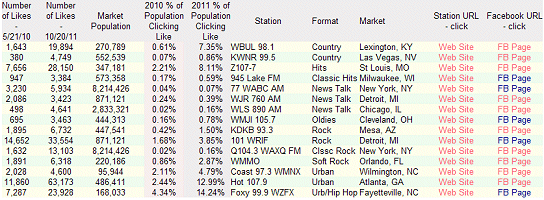 Analytics, Metrics and Music for the Radio Industry
Analytics, Metrics and Music for the Radio Industry
 An Indie Artist Pipeline to Internet Radio
An Indie Artist Pipeline to Internet Radio
 Radio Industry ROI Strategy
Radio Industry ROI Strategy
 A New Breed of Indie Artists
A New Breed of Indie Artists
Measuring Social: Most Difficult, Most Important
Analytics and metrics are two up-and-coming items that the radio industry hasn't quite sunk its teeth into. Data that tells a radio strategist how their ideas are performing just floats around online; unfortunately, it is not gathered, collated or dissected for hints on how radio can do a better job in its new media world.
This is a rather harsh assessment, but describing analytics and metrics as being "non-existent" in radio is supported by how little space the industry press and conferences devote to the topic.
| "My lightbulb moment was in realizing that using this data I could improve response, on-the-fly, as the campaign ran its course." |
In earlier years I fought against knowing how my ad campaigns performed. If the client liked the radio or television commercial I created, my job was done. WebTrend data reports were fine for tracking how Audio Graphics' web sites were doing, but measuring broadcast campaigns (circa: 2000) was not a priority. |
Then Google went and released its Google Analytics, a free online analysis system that - in my opinion - ran circles around WebTrends of the day. I was hooked on the numbers. Hooked on knowing whether my online actions were correct, or mistaken. Most excting was that this measuring of response could be applied to over-the-air campaigns.
My lightbulb moment was in realizing that using this data I could improve response, on-the-fly, as the campaign ran its course.
I've been on an almost impossible journey through analytics and metrics. Having nailed the minutiae of data sets and metrics analysis as they applied to web sites and ad campaigns, I started looking at social media. The question: Were the efforts a radio station put into a Facebook or Twitter presence worthwhile?
The objective, I thought, was simple: Measure the time and resources devoted to implementing a social media strategy. 18 months later, this has turned into the biggest, hardest project I've undertaken.
Perhaps if AG was a larger corporation that devoted a person or team to social media, our efforts to quantify "results" from social media activity would be easy. Instead, for me while most important, it is also most difficult.
Methodology is adjusted to fit my expanding social media knowledge.
I'm still adjusting. Not ready to say anything other than this: for me, social media requires far more effort than its response deserves. Having said that, know that gauging technology's worth requires systematic, multi-level attacks. I am still exploring a variety of approaches to using SM. Maybe I'm the one who's "missing it." (Ignorance shrinks the deeper you get into unchartered territories.)
This assessment may not apply to you, but it's what I take from over 18 months of working with social media: Most people are talking and few are listening on an SM platform like Facebook, Twitter, Linkedin, Google+, etc.
To simplify this, what follows applies to Facebook only.
Let's exemplify one point of confusion by examining this chart. Click on it to see a list of 15 radio stations, randomly chosen in May 2010 and rechecked on October 20, 2011. Column data contains:

 Number of "Likes" on the date
Number of "Likes" on the date
 % of "Likes" to market population then
% of "Likes" to market population then
 % of "Likes" to market population now
% of "Likes" to market population now
 *Market Population" is the city of license, not ADI
*Market Population" is the city of license, not ADI *Multiple "Likes" can come from the same person.
*Multiple "Likes" can come from the same person.
Here are a few questions to ask before digesting this.
 1) Given that a "like" is a lifetime accumulation of persons liking any of
1) Given that a "like" is a lifetime accumulation of persons liking any of a station's posts, can meaningful information be determined from this number?
a station's posts, can meaningful information be determined from this number? 2) Do you have a way of collating an SM posting to a "success" metric?
2) Do you have a way of collating an SM posting to a "success" metric? 3) Does the person doing your social media posting track what they post, by day/time?
3) Does the person doing your social media posting track what they post, by day/time?Moving from the well-defined analytics of campaign and web site usage to the abstract and unmeasurable metrics of social media, my lean is that we have a monstrous movement by people who are swimming like fish in a school. Counting their actions, or gaining a measurable sense of "results," is not possible using "like" as a metric. Measuring Facebook with its new, limited Insights page does little to help either.
The radio industry is flying by the seat of its pants at Facebook, on Twitter, at Google+, etc. In this case, nobody is asking the big question: What do we find when we measure social media impact?
I know it's most difficult, and it appears at this time to be most important. But, if the radio industry is going to dive into social media with such intensity, shouldn't someone be seeing whether the results are worth the effort?
This is a good time for the RAB or NAB to create a study on SM success, then announce its findings to the industry.









